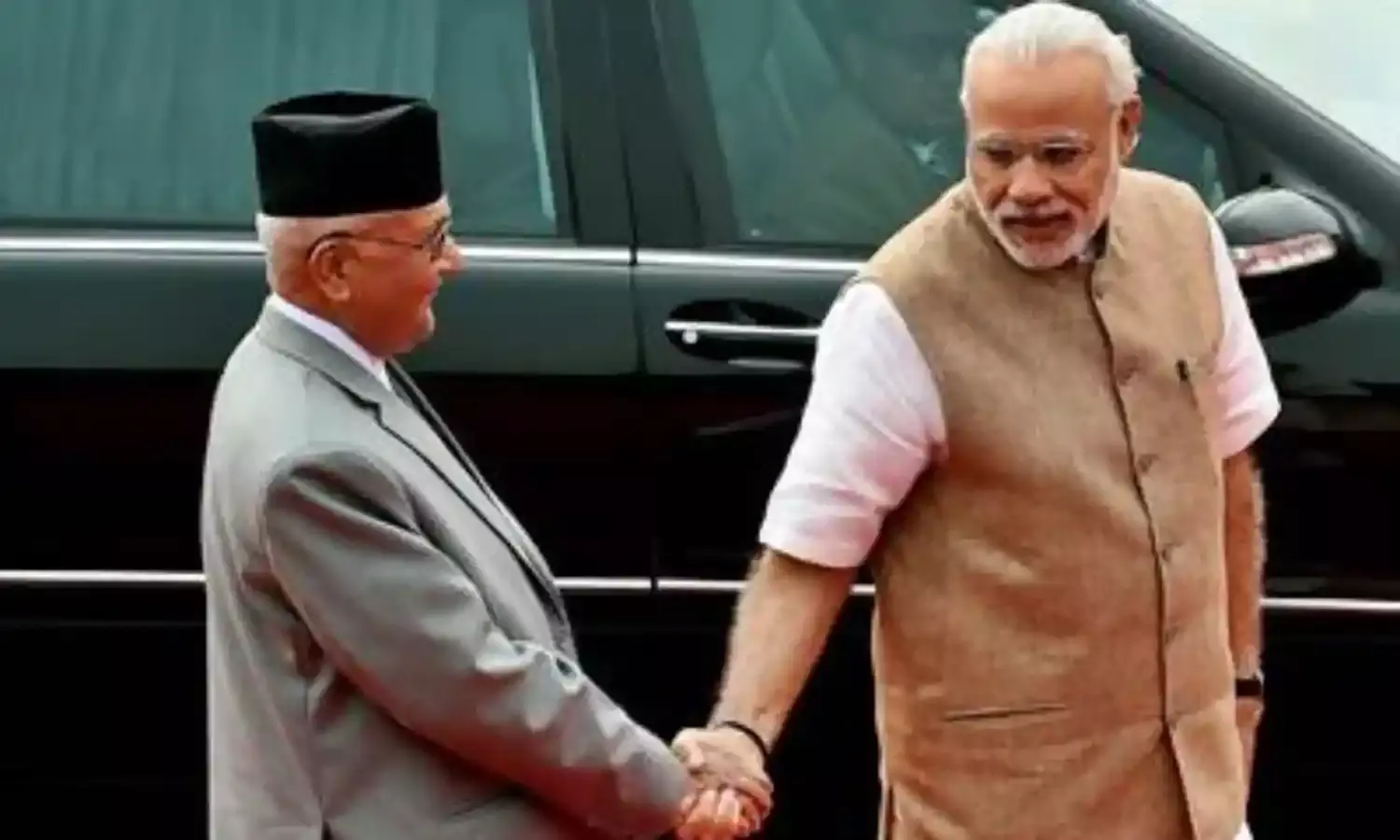Nepal’s Oli Wins ‘Game Changers’ From India
A “successful” visit

The projection of Nepalese Prime Minister K P Sharma Oli as “pro-China” seems to have helped rather than hindered him in dealing with New Delhi.
On his first (foreign) visit to India, from April 6-8, since becoming Prime Minister after the Left Alliance’s landslide electoral victory, Oli took home handsome bilateral gains. It would not be surprising if Oli had taken calculated advantage of his perceived ‘Chinese tilt’ to make Prime Minister Narendra Modi’s government reboot the relationship and offer big-ticket infrastructure projects. And all this, with the objective of outdoing China’s infrastructure push in Nepal, which India views with increasing concern, if not alarm.
Therefore, it is not surprising that Oli’s three-day visit has been hailed as “successful” by both sides. It has been successful from the Nepalese viewpoint because India has been compelled to recognise and accept the new reality of an assertive Nepal that is no longer willing to be dictated to by its southern Big Brother.
India has reasons to see Oli’s visit as a success because it offered an opportunity to remove misgivings which have come to the fore in recent years, reset India-Nepal relations, put ties on a new and pragmatic trajectory and, above all, become resolve to “good neighbours” again.
Most important is that India was ready to please Nepal anew, and Nepal was willing to be pleased as reflected in the enthusiasm on both sides for the electrified railway link between Raxual and Kathmandu, which Foreign Secretary Vijay Gokhale aptly described as a “game changer”. The cross-border rail-link project is the principal outcome of the visit and, doubtless, is India’s counter-move to China’s proposal to extend its railway in Tibet to Nepal.
Another infrastructure game changer proposed on the occasion is to provide Nepal with inland waterway connectivity for cost efficient transportation of cargo. In addition to land and water links, agriculture was mooted as another major area of cooperation. Gokhale pointed to railways, waterways and agriculture as the new “game changing” areas of cooperation.
However, the potential of the game changers can be actualised only if the atmosphere is made conducive by eliminating not only the misgivings but also the distrust and suspicion that have come to mark India-Nepal relations particularly since 2015. As expected on the occasion, Modi and Oli resolved “to work together to take bilateral relations to newer heights on the basis of equality, mutual trust, respect and benefit.” That is easier said than done, especially given the burden of grievances weighing on India-Nepal relations.
Without going into great detail, too much history or the entire gamut of the relationship, the source of distrust and loss of warmth in India-Nepal relations can be traced to three actions of the BJP-led government. India tried to dictate what Nepal’s new constitution should be. Long after it was finalised on the basis of an all-party consensus, India sent its Foreign Secretary (S Jaishankar) to scuttle the constitution’s promulgation just days before it was to be done.
Two, India was seen to be backing the Madhesis (the plains people in the Terai region) and their agitation against the constitution. And, as part of this, India enforced a blockade, which then Prime Minister Oli had declared as “an act of inhumanity worse than war”. The blockade drove Oli to embrace China for supplies of essentials, especially oil. The Madhesi agitation saw Oli being toppled as prime minister – which, too, is attributed to the ‘India hand’.
To make matters worse, when Oli’s party -- at the helm of the Left Alliance with the Maoists -- won the election last year, India was conspicuously slow in congratulating the winners; although External Affairs Minister Sushma Swaraj made up for the lapse with a visit. Again, New Delhi was perceived to be backing Prime Minister Sher Bahadur Deuba – whose Nepali Congress came a miserable third in the elections –and goading him to delay Oli from being sworn in as prime minister.
For all that and the anti-India rhetoric that marks electionering in Nepal, Oli knows that he needs India’s backing to not only remain in office but for political stability, which is a pre-condition for any measure of economic development in Nepal. In the event, he has to make peace with New Delhi just as India, too, has no option but to go along with the party in office in Kathmandu at any given time.
The developments of 2015-2016, which resulted in Oli’s ouster and his thumping electoral victory last year are a reminder that perceived interference by Indian interests can be counterproductive to bilateral relations and provide room for China to expand its presence and influence in Nepal.
Oli, more than any other prime minister, has been at pains to impress on India that bilateral relations should be based on sovereign equality, mutual respect, common interests and non-interference in each other’s internal affairs. Unless this is accepted in letter and spirit and applied in practice by the governments of both Oli and Modi, it would be difficult to dissolve the distrust and revive the lost warmth in India-Nepal relations.
In fact, changing the atmosphere is no less important a game changer, intangible as it may be, for the tangible game changers to succeed.
(Shastri Ramachandaran, a senior journalist, is Co-editor of the book State of Nepal)



